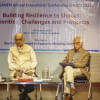Weak financial system always a problem for economic management

Bangladesh's economy is facing several challenges originating in the domestic and external fronts. The war in Ukraine, rising commodity prices and subsequent inflation and imports that are higher than exports and remittance inflow have widened the country's external deficit, caused depreciation of the taka and created pressure on the foreign exchange reserves. This happens when global economic growth is forecast to slow down. Against the backdrop, economist Prof Wahiduddin Mahmud spoke at an economists' conference, "Building Resilience to Shocks: Priorities, Challenges and Prospects", in Dhaka on Saturday. The following is the full text of his speech.
The conference title refers to the crisis in the global economy, created first due to the Covid pandemic and then due to the Russia-Ukraine war that has unfortunately turned into an economic war as well.
The immediate outlook for the new year is not as bad as had been predicted before. The Chinese economy is opening up, the industrialised West is adjusting and realigning their economies to the new realities, and a global economic recession does no longer seems inevitable.
But one thing is sure: the global economy will at best be able to adjust to new realities, and things won't be as before. So, we may be optimistic about turning the corner, but the doomsayers need to be heeded as well.
The question is how are our economies coping at the moment, and what lessons have we learned to prepare ourselves for such global economic turbulence in future.
India is doing fairly well in spite of a large drawdown on its huge foreign exchange reserves, Sri Lanka and Pakistan seem to continue to be in trouble, and Bangladesh is coping somehow, although high inflation is making life difficult for the poor and the newly poor.
One immediate lesson for the future is that we need more coping power in terms of having sufficient foreign exchange reserves to avoid balance of payment crisis, and we need more fiscal space to be able to stimulate the economy and strengthen social security measures at difficult times.
The government may have to resort to deficit financing on a large scale leading to excessive monetary expansion that may exacerbate both inflation and balance of payment problem.
In this respect, among the South Asian countries, Bangladesh and Sri Lanka both have a problem, with revenue-GDP ratio around only 10 per cent or even less.
Regarding a safe amount of foreign reserves, the generally prescribed IMF criterion of defining adequate foreign reserves is in terms of a given number of months' equivalent of import needs. But this has to be considered in light of the specific country situations like the nature of traded items and the prospective volatility of global markets in those items; the forecast of debt repayment obligations and not just the current debt-GDP ratio, the country's food security needs. All this vary across countries.
We have seen that a build-up of reserves may lead to complacency. Bangladesh, for example, was tempted to commit a significant portion of its reserves to project funding, forgetting that reserves should not be treated as budgetary resources, but only as a cushion for unforeseen external shocks.
We should be aware of another miscalculation. Even if current debt-GDP ratio may not have crossed the red line; nevertheless a debt repayment crisis may be in the offing, if there are too many mega-infrastructure projects being taken up through foreign funding without an understanding of whether such projects will attract enough private investment especially in export-oriented industries. At the same time, a mega project, once started needs to be completed in time, since a delay in implementation is hugely costly to the economy.
That's why mega projects need very careful scrutiny in terms of timing, financial commitments, cost recovery and prioritisation. Just going for any project that looks "prestigious" and for which suppliers' credit is available irrespective of priorities and future debt financing obligation - that's simply not the way to go.
Coping with shocks needs careful coordination of fiscal, monetary and exchange rate cum reserve management policies to restore external, fiscal and aggregate supply-demand balance. Economic bureaucrats in the government may become too complacent when the going is good, content with a policy status quo or at best some incremental policy adjustments. It may not be realised that a coordinated policy approach needs more in-depth analysis and expert advice. The IMF prescriptions often work as a default mode to lean back on, but those prescriptions may not be informed by country-specific situations.
Take the case of fuel prices. The sudden hikes in international high fuel prices have been the trigger for the current global economic crisis. The usual IMF prescription of aligning domestic prices to global prices is generally a good idea, because subsidies on fuel can be quite burdensome for the government's budget, and can be justified only if targeted to very specific groups or for specific purposes, such as fuel needs for irrigation by poor farmers. But very sharp and sudden hikes in domestic fuel prices may lead to price increase across the board at a time when there is already inflationary pressure in the economy.
The problem is exacerbated if the government has to rely heavily on fuel taxes for revenue purposes, as is the case in Bangladesh, where VAT on fuel is an important source of revenue. VAT is in principle a tax on consumption and is imposed on intermediate goods only as matter of expediency. But a universal intermediate input like fuel should not be a major source of VAT revenue collection. In fact, if VAT on fuel could be waived, there would have been hardly any need for the last year's sudden fuel price hike in Bangladesh.
Then again, after years of complacency about global food prices, the present crisis has been a reminder that there should be a renewed emphasis to food security in terms of investments in agricultural research and extension, food storage and public food distribution programmes.
One problem of taking timely decisions in anticipation of any impending shocks is that none of the policy alternatives may look attractive; it's often a case of choosing a policy that will lead to the least adverse outcome. The necessary policy adjustments may thus be postponed because of the temptation for macroeconomic populism or pressure from vested interests or sheer business-as-usual-type inertia.
For example, in Bangladesh, we could have let Taka depreciate at a moderate pace to align with the real exchange rate and build up even more respectable foreign reserves when the going was good. Now, faced with a huge current account deficit, we have a dilemma of either to let the exchange rate take a huge plunge which will exacerbate domestic inflation further hurting the poor, or to take the extra ordinary measure of rationing the opening of LCs, which is rather chaotic and is clearly in violation of the policy of current account convertibility of taka - a policy we adopted in the early 2000s.
Again, to help businesses recover in the aftermath of the Covid crisis, we introduced caps in the lending rates of banks; but we now find it difficult in the face of opposition from business groups to ease the interest rate caps in the interest of economic stabilisation. Note that the IMF will usually advice complete liberalisation of interest rates based on the textbook logic of optimal allocation of resources. But there is a counter argument as well. In a weak banking system ridden with wilful loan repayment defaults, the interest rates may be driven too high by those unscrupulous borrowers who take loans with the very understanding of being able to get interest waivers or to simply get away without loan repayment. So relaxing the interest rate caps is fine, but only with some caution, step by step.
Another important lesson is that a weak financial system is always a problem for economic management, but much more so at times of economic shocks. A banking system already burdened with huge portfolios of nonperforming loans is simply ill-equipped to handle the government's economic recovery package such as was delivered in the aftermath of the Covid crisis. Even a more serious problem is that a weakly governed financial system is unable to prevent illegal capital flight abroad that are likely to take place at times of economic uncertainty.
The overall lesson here is that, there is need for an active, capable and pragmatic government with sufficient institutional capabilities. To absorb shocks and ensure a soft landing, the coping policies have to be clever and nimble, and informed by adequate analysis and information. Even in a general environment of deficient governance, there must be at least some key government agencies that are well- resourced and professionally competent and able to identify problems, work out solutions and act promptly.
Let me come to my last point. We need to consider the decline in the global economic governance and the rise of reginal trade agreements. Due to the Russia- Ukraine war, there is also a realignment in the global geo-political arrangements. This means that we are not going back to the pre-crisis global economic order.
We definitely need to reemphasise South-South trade cooperation arrangements, given that SAFTA is now almost defunct. It's sometimes argued that our types of countries have the same lists of potential export items, thus limiting the scope of regional trade. But, there is still much unexploited potential for intra-sectoral trade for developing regional supply chains. Of course, no regional trade blocs are yet even nearly self-sufficient, so that economic globalisation is bound to remain important.
Then we have now multiple regional economic powerhouses, India being one of those. For Bangladesh, the country can potentially benefit from being strategically positioned in the neighbourhood of two economic powerhouses, India and China. But it has to negotiate its way cleverly, without being sandwiched by the opposing pressures coming from those two giants. Clearly, in the new realigned global economy, economic diplomacy has to take a front seat.

 For all latest news, follow The Daily Star's Google News channel.
For all latest news, follow The Daily Star's Google News channel. 







Comments